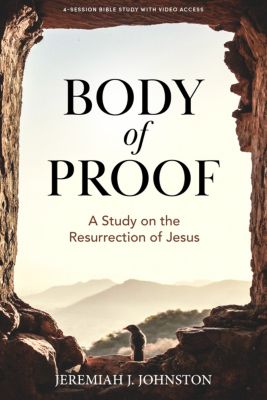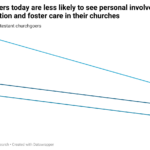
Having a weak understanding of the implications of Jesus’ resurrection keeps Christians from living fully in Spirit-filled power.
By Jeremiah J. Johnston
The 20th-century German literary giant and novelist Franz Kafka was fond of saying, “The meaning of life is that it ends.” And for most, the end comes all too soon. But then what happens? “When a person dies, will he come back to life?” (Job 14:14, CSB). This is a deeply theological and practical question in the earliest writings of the Old Testament. How we answer this question of life after death is a game changer.
Unfortunately, far too many Christians are clumsy about their resurrection faith. We can look at the example of Great Britain. It’s a centuries-old bastion of Christian thought. Yet in modern times, the majority of believers flounder in their fundamental understanding of the resurrection. One in four people who claim to be Christians in the U.K. disavows the bodily resurrection of Jesus completely. The numbers in the U.S. are equally breathtaking. According to the biennial State of Theology research study published by Lifeway Research, only 47% of American adults “strongly agree” the physical, bodily resurrection of Jesus was an actual historical event. In a 2022 global data point, the Barna Research Group revealed only 33% of teenagers believe Jesus rose from the dead.
Resurrection-centric preaching
Having researched and published over 250,000 words on the resurrection of Jesus, I believe one of the contributing factors for the lackluster acceptance—and even waning—of resurrection belief in modern Christianity is because pastors under-preach and under-study the resurrection of Jesus. Outside of funeral and Easter sermons, the resurrection is more of a footnote than a focal point in modern preaching. But this is incongruent with the Christian faith and practice we see reflected in the Bible.
“One of the contributing factors for the lackluster acceptance—and even waning—of resurrection belief in modern Christianity is because pastors under-preach and under-study the resurrection of Jesus.” — @_jeremiahj Click To TweetIn an absolutely devastating passage, Paul makes clear what is at stake with the resurrection. Apart from this event, the faith of his hearers was vain, and they were still trapped in sin (1 Corinthians 15:17). How often do believers today hear challenging words such as these? Believers may go weeks or even months without learning about or considering Jesus’ resurrection. Even so, we are living in the “Golden Age of Christian Apologetics” with access to resources and evidence that support the “Body of Proof” for Jesus’ resurrection from the dead.

The prominence of resurrection-centric faith in New Testament preaching
C.S. Lewis powerfully taught the primacy of Jesus’ defeat of death saying, “In the earliest days of Christianity an ‘apostle’ was first and foremost a man who claimed to be an eyewitness of the resurrection . … To preach Christianity meant primarily to preach the resurrection.” Jesus’ resurrection is a central focus of our New Testament Scripture. A staggering 300 verses in the New Testament address the resurrection across its 260 chapters. When we study what the Bible teaches about the resurrection of Jesus, the power this singular historical event had on Jesus’ early followers is striking. We can also recognize the church’s explosive growth as they spread the gospel, or “good news” of Jesus’ resurrection, throughout the world.
When we search the Scriptures, we see belief in bodily resurrection empowered the early church to “[turn] the world upside down” (Acts 17:6, CSB). Every sermon in the book of Acts focused on the resurrection of Jesus. More than 20 times, Scripture promises that the Christian’s future bodily resurrection is linked to the historical fact of Jesus’ resurrection (John 14:19). Resurrection faith was the key to Christian ethics (1 Corinthians 15:58–16:1) that made the gospel irresistible in the corrupt Roman Empire. Resurrection faith brought hope in moments of worldly despair (2 Corinthians 1; Romans 8:18). And resurrection faith caused the earliest followers of Jesus to become the greatest force for good on earth (Galatians 3:28).
“The promise of a glorified resurrected body is the overpowering truth of Jesus’ resurrection.” — @_jeremiahj Click To TweetThe promise of a glorified resurrected body is the overpowering truth of Jesus’ resurrection. So make the most of each day, because everything we do matters for the kingdom of God (1 Corinthians 15:57-58). In fact, “deathlessness” is the main descriptor of our future resurrection bodies; they cannot die. They will be physical bodies, not spirit-ghosts, phantoms, or apparitions. We know this because Paul told the church at Philippi that Christ would “transform the body of our humble condition into the likeness of his glorious body” (Philippians 3:21a, CSB).
Christ was raised in a physical body, and Scripture tells us our resurrection bodies will be patterned after His body. Jesus also told His disciples, “Look at my hands and my feet, that it is I myself! Touch me and see, because a ghost does not have flesh and bones as you can see I have” (Luke 24:39, CSB). Author Lee Strobel sums it up best: “Every single shred of evidence for the resurrection of Jesus Christ is also evidence for my eventual resurrection.”
The significance of resurrection-centric faith in New Testament preaching
I return to Lewis’ wise words in Mere Christianity, “Hope is one of the Theological virtues. … If you read history you will find that the Christians who did most for the present world were just those who thought most of the next.” But those who weaken their hold on the truth of the resurrection of Jesus, weaken their hold on God. To be sure, the gospel teaching and the apologetic significance of Jesus’ resurrection are probably the most common applications regarding Jesus’ resurrection. However, under-taught is the idea that Jesus’ resurrection is also connected to nearly every major theological doctrine as well as many practical areas of Christian living. So, having a weak understanding of the implications of Jesus’ resurrection keeps Christians from living fully in Spirit-filled power.
“Jesus’ resurrection is connected to nearly every major theological doctrine as well as many practical areas of Christian living.” — @_jeremiahj Click To TweetFor believers today, 1 Peter 1:3 serves as a much-needed reminder and promise. “Blessed be the God and Father of our Lord Jesus Christ. Because of his great mercy he has given us new birth into a living hope through the resurrection of Jesus Christ from the dead” (CSB). Yet, we minister in a society that has largely given in to despair—that’s lost hope. Scores of people wonder: “What is the point of life?” But the resurrection is what gives us hope. According to Jesus, it gives us purpose. You can pour out your whole life in a God-serving way. That’s what the resurrection does for us. We are and continue to become the people who bring hope.
Remarkable as it may seem, nearly 100 times in the New Testament the word “hope” describes the believer in Christ. What’s fascinating is that hope in God, as much as faith in God, is the hallmark of our new life in Christ. “Through him you believe in God, who raised him from the dead and gave him glory, so that your faith and hope are in God” (1 Peter 1:21, CSB). As we trust in God, we must wrap ourselves in the truth that our hope stands. Jesus Christ shattered the gates of death for us and now reins as our living Lord. He is alive. We are, right now, alive with Him. In other words, our living hope is based on the historical, unchangeable fact of Jesus’ physical, bodily resurrection from the dead. Only a high view of Jesus’ resurrection honors the God of resurrection truth.
We say we believe in the resurrection of Jesus based on scriptural teaching. We say we trust in the validity of the resurrection of Jesus based on the overpowering evidence. And we say we regard the Scriptures, in their entirety, as inspired and authoritative. We say the deity, death, and resurrection of Jesus are central to the gospel message. If all this is the case, we should show the Bible, and specifically the resurrection of Jesus, more respect by knowing more about it and preaching it more often.
For permission to republish this article, contact Marissa Postell Sullivan.













